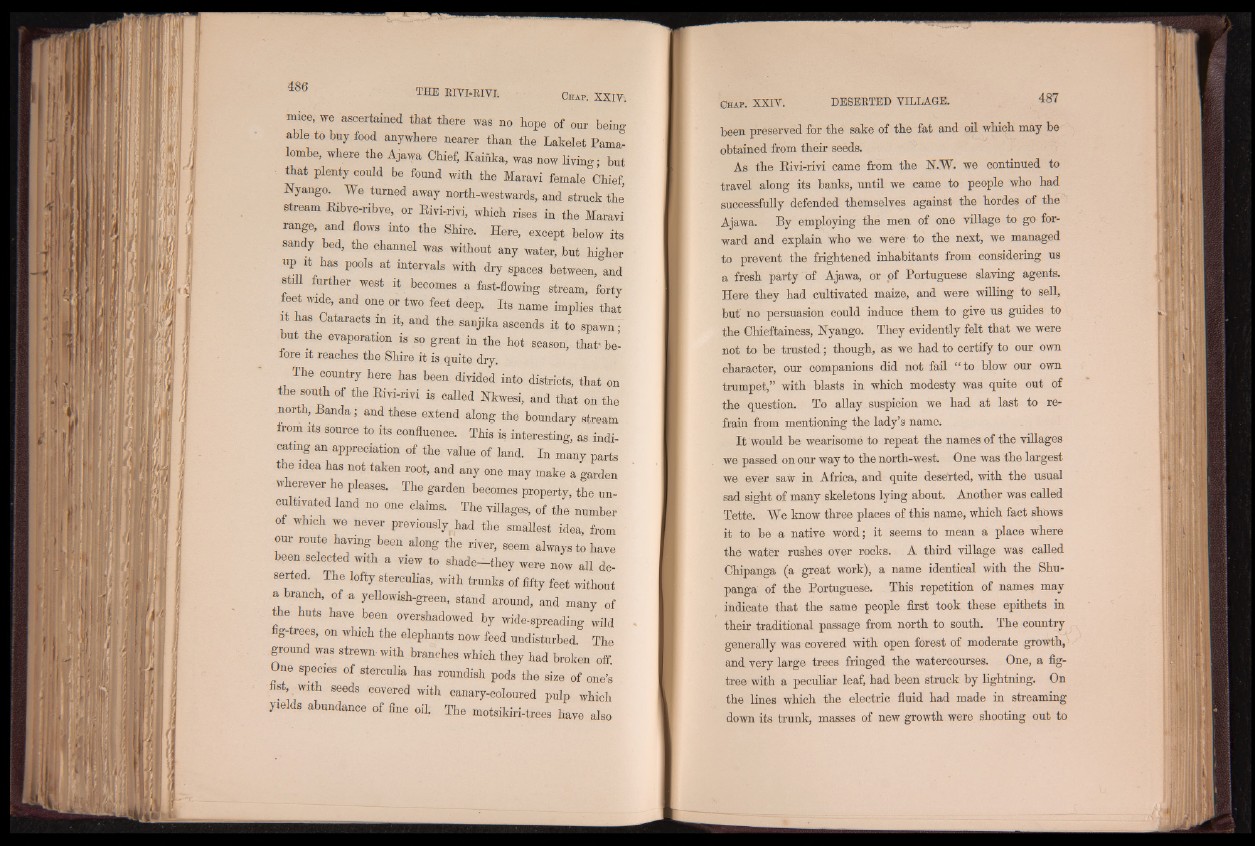
mice, we ascertained that there was no hope of our being
able to buy food anywhere nearer than the Lakelet Pama-
lombe, where the Ajawa Chief, Kainka, was now living; but
that plenty could be found with the Maravi female Chief,
Nyango. We turned away north-westwards, and struck the
stream Ribve-ribve, or Rivi-rivi, which rises in the Maravi
range, and flows into the Shire. Here, except below its
sandy bed, the channel was without any water, but higher
up it has pools at intervals with dry spaces between, and
still further west it becomes a fast-flowing stream, forty
feet wide, and one or two feet deep. Its name implies that
it has Cataracts in it, and the.sanjika ascends it to spawn-
but the evaporation is so great in the hot season, th af before
it reaches the Shire it is quite dry.
The country here has been divided into districts, that on
the south of the Rivi-rivi is called Nkwesi, and that on the
north, Banda; and these extend along the boundary stream
from its source to its confluence. This is interesting, as indicating
an appreciation of the value of land. In many parts
the idea has not taken root, and any one may make a garden
w erever he pleases. The garden becomes property, the uncultivated
land no one claims. The villages, of the number
of which we never previously had the smallest idea, from
our route having been along the river, seem always to have
been .selected with a view to shade-they were now all deserted.
The lofty sterculias, with trunks of fifty feet without
a branch, of a yellowish-green, stand around, and many of
the huts have been overshadowed by wide-spreading wild
fig-trees, on which the elephants now feed undisturbed. The
ground was strewn- with branches which they had broken off.
One species of sterculia has roundish pods the size of one’s
fisV with seeds covered with canary-coloured pulp which
yields abundance of fine oil. The motsikiri-trees have also
been preserved for the sake of the fat and oil which may be
obtained from their seeds.
As the Rivi-rivi came from the N.W. we continued to
travel along its banks, until we came to people who had
successfully defended themselves against the hordes of the
Ajawa. By employing the men of one village to go forward
and explain who we were to the next, we managed
to prevent the frightened inhabitants from considering us
a fresh party of Ajawa, or of Portuguese slaving agents.
Here they had cultivated maize, and were willing to sell,
but no persuasion could induce them to give us guides to
the Chieftainess, Nyango. They evidently felt that we were
not to be trusted; though, as we had to certify to our own
character, our companions did not fail “ to blow our own
trumpet,” with blasts in which modesty was quite out of
the question. To allay suspicion we had at last to refrain
from mentioning the lady’s name.
I t would be wearisome to repeat the names of the villages
we passed on our way to the north-west. One was the largest
we ever saw in Africa, and quite deserted, with the usual
sad sight of many skeletons lying about. Another was called
Tette. We know three places of this name, which fact shows
it to be a native word; it seems to mean a place where
the water rushes over rocks. A third village was called
Chipanga (a great work), a name identical with the Shupanga
of the Portuguese. This repetition of names may
indicate that the same people first took these epithets in
their traditional passage from north to south. The country
generally was covered with open forest of moderate growth,
and very large trees fringed the watercourses. One, a fig-
tree with a peculiar leaf, had been struck by lightning. On
the lines which the electric fluid had made in streaming
down its trunk, masses of new growth were shooting out to